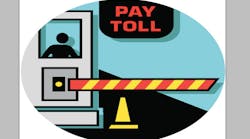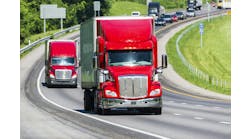The Highway Infrastructure Upkeep Debate: Tolls or Fuel Tax?
The practice of tolling America’s Interstate Highway System to finance its maintenance is the subject of a debate that has been re-stoked with the release of a new study from the Reason Foundation: “Value-Added Tolling: A Better Deal for America’s Highway Users.” The study’s author, Robert W. Poole, Jr., Searle Freedom Trust Transportation Fellow, states that the concept’s aim is to establish tolling as a true highway user fee, not a hybrid of toll and tax, and to offer a positive response to long-standing concerns of highway user groups.
Highway user groups have been leery of opening the door to Interstate tolling, Poole states in his position statement. “They are afraid that state DOTs would jump at the chance to bail out all their highway and transit programs on the backs of Interstate highway toll-payers, rather than just rebuilding their Interstates,” he writes. “And Congress fears taking on the powerful trucking industry and its new anti-tolls coalition, even though many state DOTs are urging Congress to give them tolling flexibility.”
Old Dominion Freight Line has stated that it supports increased funding for highways but oppose tolls on current federal interstate capacity. The company argues that tolls are an inefficient method of funding, would increase the cost of moving goods, and would decrease efficiency by pushing interstate traffic onto less safe and slower local roads.
American Trucking Associations (ATA) has also come out in strong opposition.
“We know our infrastructure needs are great, but we can’t be wooed by the siren song of alleged ‘tax-free’ funding,” said ATA First Vice Chairman Phil Byrd, president of Bulldog Hiway Express, Charleston, S.C. “Tolls are just another name for a tax, one that provides quite a lot of money for government bureaucrats and Wall Street financiers, and is an extremely expensive way to fund highway improvements. We should instead focus on the reliable, traditional financing methods – such as the fuel tax – that built our great Interstate system to improve and maintain that system. Our leaders simply need to have the political will to do the right thing regarding these methods.”
The International Bridge, Tunnel and Turnpike Association (IBTTA) argues that America’s 5,000-plus miles of tolled highways, bridges and tunnels generate more than $12 billion per year in transportation funding, without putting budgetary stress on local, state and federal governments.
“Now that most toll facilities are migrating to all electronic toll collection, tolls are easier to implement, cheaper to collect and more acceptable to the public than ever before,” said IBTTA’s executive director and CEO, Patrick D. Jones. “While not appropriate in every circumstance, tolling is one of the most effective and proven ways to finance the construction, operation and maintenance of heavily traveled road, bridge and tunnel infrastructure.”
The Reason Foundation study lays out five policies:
- Limit the use of toll revenues to the tolled facilities;
- Charge only enough to cover the capital and operating costs of the tolled facilities;
- Begin tolling only when construction or reconstruction is finished;
- Use tolls to replace—not supplement—existing fuel taxes;
- Provide a higher level of service for tolled Interstates.




